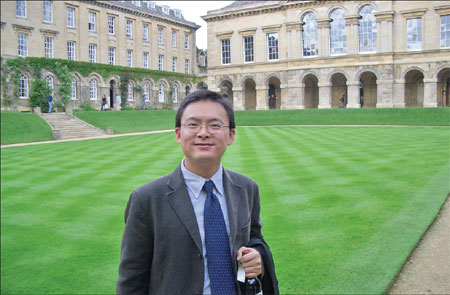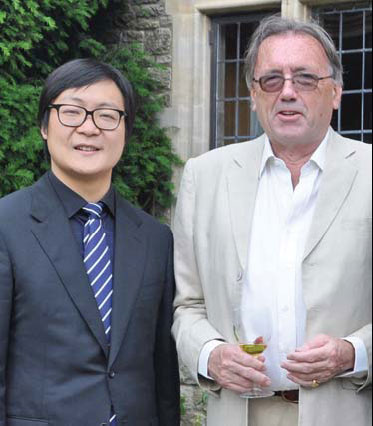A helping hand for the best and brightest
Updated: 2012-07-27 12:17
By David Bartram (China Daily)
|
|||||||||||
|
Duan Yi studied at Oxford in 2004 before going on to work at the National People's Congress in Beijing. Photos Provided to China Daily |
|
Oxford scholar Wu Yimin and COSF international chairman Timothy Beardson at the COSF summer luncheon. |
Chinese students smart enough to gain entry to Oxford University but who cannot afford the fees have a friend they can look to
Growing up in Hubei province, Wu Yimin always dreamed of studying at a world-class institution such as Oxford University.
But it was only after an encounter with a traveling Oxford professor at Wuhan University of Technology, where Wu was a final-year undergraduate, that he was encouraged to apply and won himself a place. There was just one problem - he could not afford the fees.
"After I won admission to Oxford I was so worried about the funding," Wu says. "I knew in my heart that my family could not afford to support me completely."
Luckily for Wu, there was another option. He applied to the China Oxford Scholarship Fund, a charitable group that helps Chinese students who might otherwise be unable to afford to take up their place at Oxford.
"He is one of the cases where the COSF has really changed his life," says Susan Yu, director of administration for the fund.
"He got into Oxford but didn't have enough money to get there, even with friends and family pooling money to help him. But when he applied to us, our panel interviewed him in China and were bowled over.
"The professor he met at Wuhan even wrote a follow-up letter supporting him, and in the end he was given one of our major awards."
Wu is understandably thankful for the opportunity, and will complete his PhD in the Department of Materials of the university this year.
"Without the financial support from the COSF, I would not have been able to come to Oxford to pursue my dream," he says.
This year the fund celebrates its 20th anniversary, having helped numerous students fulfil their dream of studying at Oxford, as well as strengthening ties between the university and China.
More than 400 Chinese postgraduate students are studying at Oxford University, and each year the fund receives about 130 applications for funds.
"In China, Oxford is seen not only as a leading university, but as somewhere that has been producing world leaders for a long time," says Timothy Beardson, the fund's international chairman.
"It's not just an English institution; it's a global institution that offers Chinese students an opportunity to interact with people from around the world who are likely to become significant in their fields.
"Oxford can give them a network of relationships globally, which can be of help as one's career develops. It can be useful to have a friend who is doing something similar to you, but in the government of Mexico, Brazil or Hungary. The same applies for scientists or businesspeople."
The application process is rigorous. Given that all applicants for funding must already have an offer of a place from Oxford, academic excellence is assumed. Instead, the panel is looking for something extra.
"We are looking for people who aren't just academic but have some other interest in life, whether that be music, sport or something else," Beardson says.
"We want people who are a little bit rounded, as they are more likely to get something out of the experience. In our interviews we make a big point that we want people who have a good enough standard of English that their friends will not only be Chinese students also studying overseas. So often the problem is that people only make friends with those of their own nationality, as they are not quite confident enough in the host-country language."
The fund is also looking to award those who are likely to later make a contribution toward Chinese society, says Rupert McCowan, the awards panel chairman.
"The panel considers a very wide range of criteria for the awards. All of our applicants are academically qualified, thus the most important criteria are leadership potential for the future, together with financial need.
"The most difficult part of the process is deciding who to interview. On paper, most of the applicants seem very similar, but once they are interviewed it is soon clear who are the most deserving of the award. The interview is the only good way of finding out who is likely to be a leader in the future."
This attention to detail means the fund's alumni already hold a number of government, business and academic positions across China. Duan Yi received funding to attend New College, Oxford in 2004 where he gained an MSc in comparative and international education.
Since then he has worked at the Confucius Institute headquarters in Beijing and now works for the National People's Congress.
"When I applied for my jobs at the Confucius Institute and the National People's Congress, I could sense that my Oxford experience gave me an advantage," he says.
"I still keep in touch with a number of people, including other COSF scholars, classmates, my supervisor and college adviser."
Without funding from the fund, Duan says he would have thought twice about attending Oxford. He says that by providing money the COSF is ensuring that a place at Oxford becomes attainable to those without wealthy parents.
"It is important for social justice and equal opportunities."
This sentiment is echoed by Kenneth Fok, an international trustee for the fund who himself attended Oxford.
"To many students from the mainland, Oxford represents a dream and a bright future. I have met many students from Tsinghua, Beida (Peking University) and alike who all speak of the day they received their Oxford offer letter with such enthusiasm and excitement. However, the brutal reality is that finances stood in the way of attaining this dream.
"Although China is getting wealthier ever since the opening-up, there are still an abundance of bright, diligent students who have the ability but not the financial means. This is where the COSF can contribute in our small way."
The organization has grown considerably since it was founded in 1992 by a group of businesspeople looking to help Hong Kong students with their Oxford tuition costs.
In the 20 years since, it has awarded more than 180 scholarships totaling more than 1 million euros, as well as installing the former British prime minister Margaret Thatcher as patron.
However, the aim is to ensure that the fund can continue to help students long into the future by raising an endowment of 31 million euros.
"We set this target four years ago and so far we've raised around 2 million pounds (2.6 million euros)," Beardson says. "This is a long-term target, but with the money we would eventually be able to fund 30 scholarships pretty much fully."
And if the target is met, it will mean giving other exceptional Chinese students the chance to follow in Wu Yimin's footsteps.
"The COSF is doing a great service supporting outstanding Chinese students coming to Oxford," Wu says. "These students studying abroad provide a bridge between the UK and China.
"There are many brilliant Chinese students who have the potential but not the money to fulfil their dreams. The COSF is helping China to understand the rest of the world, while also helping the rest of the world understand China."
For China Daily
(China Daily 07/27/2012 page24)
Today's Top News
Rescuers race against time for quake victims
Telecom workers restore links
Coal mine blast kills 18 in Jilin
Intl scholarship puts China on the map
More bird flu patients discharged
Gold loses sheen, but still a safe bet
US 'turns blind eye to human rights'
Telecom workers restore links
Hot Topics
Lunar probe , China growth forecasts, Emission rules get tougher, China seen through 'colored lens', International board,
Editor's Picks

|

|

|

|

|

|







